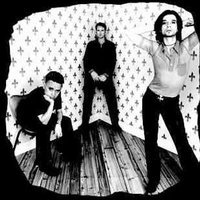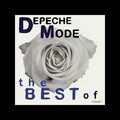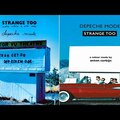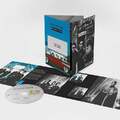Depeche Mode: 'You know you’re in dangerous territory'
Martin Gore of Depeche Mode discusses moving the band in a political direction, taking on the alt-right, surviving with U2, and what the future holds for the Basildon boys

Dave Gahan, Martin Gore, and Andy Fletcher of Depeche Mode: photographer/director Anton Corbjin gave the group their mature, sometimes fetishistic aestheticFun fact: for the Past 30 years, each of Depeche Mode’s albums has reached the top 10 in the US. Although the trio of Dave Gahan, Martin Gore and Andy Fletcher are older, wiser and sober-er, they are still riding the crest since Violator delivered not only their enduring singles Enjoy the Silence and Personal Jesus, but also their consequent breakthrough in parts of the world few bands could reach.
This unbroken record continues with Spirit, the 14th album in their 37 years together. Released in March, Spirit’s chart success (matched in Ireland where only Drake and Ed Sheeran kept them off the top spot) wasn’t a done deal for the trio. This is especially true as they are venturing into newish pastures by tackling the hot political issues of the day, from the album’s ominous opener Going Backwards to its corporate critique of Poorman, as well as the call-to-arms lead single of Where’s the Revolution.
Meeting the band’s songwriter, Martin Gore, in a hotel suite in London, where he exhibits a kind permasmile at odds with the band’s sombre sound, he says a thumbs-up wasn’t taken for granted this time around.
I think things were bad in the 1980s, but I wasn’t as scared as I am now
“Because this album is more political than we’ve ever been, I was more nervous about the reviews,” the 55-year-old says. “You know you’re in dangerous territory when you start doing social commentary, but fortunately most of the reviews we’ve seen so far have been good. If it had been universally slated, I think we would have been quite upset.”
There are easy links to be made with the album’s message and the Trump/Brexit effect, especially as both Gore and lead singer Dave Gahan are long-time US residents. But that would have required either clairvoyance or an expedited writing-recording-releasing process. In fact, Gore was lamenting the dismal state of the world well before these outcomes came to pass.
“Even back in 2015, I was watching the horrors of Syria unfold on a daily basis and that was disheartening. As were climate change deniers, though now it’s even worse,” he says.

Combusting
“Russia was going into the Ukraine and Crimea, and there was a whole spate of black people getting killed in America by police. It just seemed like everywhere you looked, the world was combusting.”
Given that Depeche Mode’s profile rose in 1980s England against a background of IRA attacks, economic recession, racial divide and Thatcherism, why is their current response their most political?
“I think things were bad in the 1980s, but I wasn’t as scared as I am now,” says Gore. “I honestly believe that we have a mad man in the White House. I’m so pleased that the American system seems to have worked to stop him repealing Obamacare and implementing the Muslim ban; I’m hoping it will work on the others too. Let’s hope the wall doesn’t go up. He’s a very petty man. And a petty man with the nuclear codes doesn’t sound like a good combination.”
Us and U2, we’re both survivors
Given their political stance – which was obvious if you had spent any time absorbing songs such as Everything Counts and Pipeline – they were the wrong choice for the US far-right figurehead Richard Spencer to declare “the official band of the alt-right” in February (to which Gahan succinctly responded by calling him “a c**t”). But that’s not the only reason they were an odd pick for that extremist title.
Depeche Mode - Where's the Revolution
“Just after Richard Spencer made that comment, someone sent me a picture of the band in one of our 1980s bad garb days,” says Gore, recalling their years at the mercy of terrible shirts and bouffant haircuts. “He wrote to me: ‘Does this look like the official band of the alt-right?’” He lets out a generous laugh, tickled at the thought.
Regret
“You’ll always get a laugh from me when someone brings out an old picture of us in the 1980s. But at the same time, I don’t regret it, because at least it was novel.”
Novel is right; during their early years, these Basildon boys were the polar opposite to the sultry electronic rock act that we now associate with Gahan, Gore and Fletcher (co-founder Vince Clarke quit during the release of their debut album Speak & Spell, going on to form Yazoo, Erasure and later with Gore, VCMG).
The musical change is attributed to Gore, who took over songwriting duties and led the group in a darker direction with singles such as Master and Servant and Shake the Disease. But it was Anton Corbjin, the photographer and director, who gave the group their mature, sometimes fetishistic aesthetic.
“Anton wouldn’t work with us before, but it was no coincidence that once we found our footing with Black Celebration in 1986, he became involved and he’s been heavily involved ever since. He helped shape our image, and that helped us to be taken more seriously. Because we had to jettison our pure pop past. I mean, the first album was so pop.”
Groundbreaking
At that point, Corbjin was known for his groundbreaking work with U2, demonstrating the importance of strong visuals that still define the band to this day. But that’s not all the bands have in common now; there’s the longevity too.
“Us and U2, we’re both survivors,” Gore says. “People spoke about us and U2 in the same sentence, which is fine. Even though we come from the same era, we never really felt that our music was that similar, so that meant there was never really a big rivalry.”
Yet the course of Depeche Mode hasn’t run smoothly; they have faced near-fatal drug abuse (Gahan), illnesses (Gore’s seizures) and personnel upheavals (Alan Wilder leaving in 1995). Personal issues aside, they were also less fortunate than suggested by their 100 million sales in meriting industry acclaim. An example is their nomination but ultimate exclusion from this year’s Rock & Roll Hall of Fame induction.

But who needs accolades when there are fans to entertain? While Ireland hasn’t been announced as part of Depeche Mode’s extensive summer European tour, they hope to make it over in the 12 months they will spend touring Spirit. A winter visit is most likely, according to Gore. After that, the trio have yet to discuss the band’s direction.
“We’re not the sort of band who sits down and discusses our plans too much,” he says. “When people ask if this will be our last album, I always say I don’t know – and I’ve been saying that since 1986.
“Right now we seem to be riding the crest of a wave: the album is doing well, the shows are selling out. So it doesn’t seem like we should call it a day. It’s a good time to be in Depeche Mode.”





